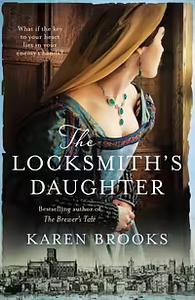Take a photo of a barcode or cover
my library loan expired and I did not feel even the remotest of needs to renew it (even though there was no one in the queue for it, and even though I was enjoying the reading experience well enough when I was actually picking up the book)
The direction taken by this book is really frustrating. The blurb makes it sound like Mallory is a badass lady with a checkered past who gets trained to be a spy, but then realises she stands for a different sort of justice. In actuality, Mallory's moral stance on the Catholic vs. Protestant conflict is sidelined in favour of her personal conflicts. But even there, she is given no chance to triumph over the men who have manipulated or even abused her - in fact, for all her skills, she is thwarted pretty much as soon as she rebels.
For instance: an expert lock-pick, Mallory steals the most important book of intelligence belonging to Sir Francis, and attempts to exchange it for her father's freedom. Instead, she is taken prisoner, and is tortured and demeaned. When she eventually escapes, you'd think it'd be because she, I don't know, picked the lock? But no! Her beau Nathaniel has come to rescue her, by the simple expedient of bribing the guards. She's a damsel in distress when she should be a heroine making a stand. And then, Sir Francis asks Mallory's forgiveness by proxy of an agent, and she says she understands why he imprisoned her in the first place. Just like that.
This gets at the heart of my issue with Mallory as a protagonist: contrary to her surname, she isn't very bright. It's one thing to want to portray a woman of that time, who would've been socialised to believe that she had 'fallen' because she had sex out of wedlock. It's quite another to have her recollect graphic scenes of rape and physical abuse, yet still continue to believe she was the one at fault. To be clear: on discovering that she was pregnant, the man she eloped with beats her and rapes her until she delivers a stillborn. In what universe does a woman survive a situation like that, and not harbour at least some faint notions that she was wronged, not in the wrong?
It's hard enough to be sympathetic to Mallory. That aside, I didn't think much of the writing (many instances of clichéd imagery that made me physically cringe) and the story itself. The most promising point, I thought, was when Mallory was feeling conflicted about her role as a spy. She liked having a job she was competent at; it gave her a sense of empowerment at a point when her reputation was in shambles. Yet reporting intelligence to Sir Francis resulted in the persecution of Catholics whom she believed to be peaceful, not threatening the Queen. That's character motivation right there. You know what's not character motivation? Laying aside any thought of espionage in order to dive into a romance subplot with Lord Nathaniel, even as the memory of her elopement and trauma continues to haunt Mallory, and she feels guilty for succumbing to her desires yet again.
I'm sorry, but I really didn't enjoy this book.
For instance: an expert lock-pick, Mallory steals the most important book of intelligence belonging to Sir Francis, and attempts to exchange it for her father's freedom. Instead, she is taken prisoner, and is tortured and demeaned. When she eventually escapes, you'd think it'd be because she, I don't know, picked the lock? But no! Her beau Nathaniel has come to rescue her, by the simple expedient of bribing the guards. She's a damsel in distress when she should be a heroine making a stand. And then, Sir Francis asks Mallory's forgiveness by proxy of an agent, and she says she understands why he imprisoned her in the first place. Just like that.
This gets at the heart of my issue with Mallory as a protagonist: contrary to her surname, she isn't very bright. It's one thing to want to portray a woman of that time, who would've been socialised to believe that she had 'fallen' because she had sex out of wedlock. It's quite another to have her recollect graphic scenes of rape and physical abuse, yet still continue to believe she was the one at fault. To be clear: on discovering that she was pregnant, the man she eloped with beats her and rapes her until she delivers a stillborn. In what universe does a woman survive a situation like that, and not harbour at least some faint notions that she was wronged, not in the wrong?
It's hard enough to be sympathetic to Mallory. That aside, I didn't think much of the writing (many instances of clichéd imagery that made me physically cringe) and the story itself. The most promising point, I thought, was when Mallory was feeling conflicted about her role as a spy. She liked having a job she was competent at; it gave her a sense of empowerment at a point when her reputation was in shambles. Yet reporting intelligence to Sir Francis resulted in the persecution of Catholics whom she believed to be peaceful, not threatening the Queen. That's character motivation right there. You know what's not character motivation? Laying aside any thought of espionage in order to dive into a romance subplot with Lord Nathaniel, even as the memory of her elopement and trauma continues to haunt Mallory, and she feels guilty for succumbing to her desires yet again.
I'm sorry, but I really didn't enjoy this book.
This is quite simply a work of literary prowess. While I have not read much in the way of historical fiction in the past, I can say I am definitely inclined to now. It kept me enraptured from the start, and never ceased to amaze me. Love is an understatement in regards to this masterpiece
DNF'd it at about 75 pages. It was just wayyyy too wordy for me, and I couldn't get into the flow of the language. Some authors are able to write with a flow that works for "old english" speaking, but this one just couldn't get me into it.
medium-paced
dark
medium-paced
Plot or Character Driven:
A mix
Strong character development:
Yes
Loveable characters:
Complicated
Flaws of characters a main focus:
Yes
Moderate: Rape, Torture
Minor: Abortion
This novel was a slow to get started and then was hard to put down. It’s a bit overlong, although the historical period (Elizabethan England) is very interesting and there’s plenty of real events included in the story. Some of the relationships seemed a bit melodramatic and the violence of torture and executions were not what I expected in this kind of book going by the cover of my edition! Overall a satisfying read but not brilliant for me.
The Locksmiths Daughter is a great book to escape into. It made me happy to be a woman of the present and not the past (as much historical fiction does). Mallory is such an amazing and strong character, full of love, strength and regret. Her story line is mapped perfectly. I was gutted when their was an authors note at the end of the book and not more of Mallory's tale. It is a great read and very hard to put down.
**I received a complimentary copy via NetGalley in exchange for an honest review**
I’m going back and forth between 2 and 3 stars - I would give 2.5 if I could. This moved so slowly for the first half but then turned in to a weird sappy love story for the second half. It felt like two different authors wrote this. I like the premise of the overall book but wished it had moved faster and that he love story was left out.
I’m going back and forth between 2 and 3 stars - I would give 2.5 if I could. This moved so slowly for the first half but then turned in to a weird sappy love story for the second half. It felt like two different authors wrote this. I like the premise of the overall book but wished it had moved faster and that he love story was left out.



